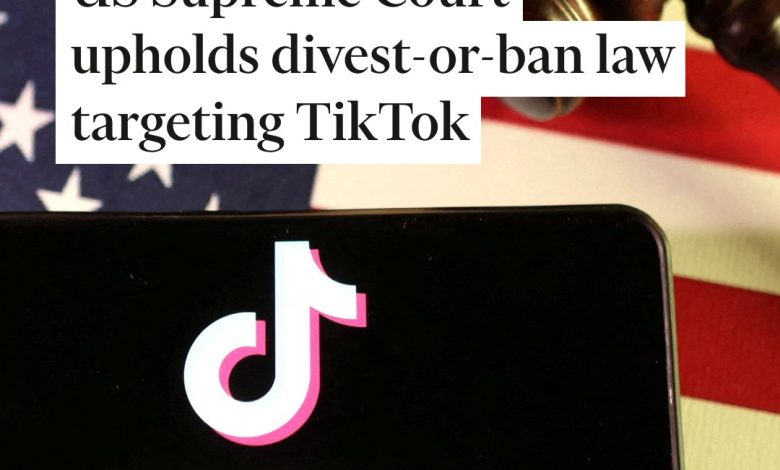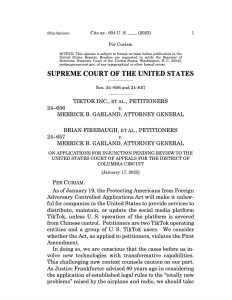US Supreme Court Bans Tittok, Rules January 19

The Supreme Court ruled against TikTok on Friday, rejecting the social media company’s First Amendment challenge to the law that effectively bans it in the United States starting on Sunday.
The unanimous decision may deal a death blow to the U.S. operations of the wildly popular app, which serves up short-form videos that are a leading source of information and entertainment to 170 million Americans, especially younger ones.
“There is no doubt that, for more than 170 million Americans, TikTok offers a distinctive and expansive outlet for expression, means of engagement, and source of community,” the decision said. “But Congress has determined that divestiture is necessary to address its well-supported national security concerns regarding TikTok’s data collection practices and relationship with a foreign adversary.
President Biden signed the law last spring after it passed Congress with wide bipartisan support. Lawmakers said the app’s ownership represented a risk because the Chinese government’s oversight of private companies allows it to retrieve sensitive information about Americans or to spread covert disinformation or propaganda.
Although TikTok’s lawyer told the justices last week that the app would “go dark” if it lost the case, it was not clear how quickly a shutdown would play out. At a minimum, app store operators like Apple and Google will face significant penalties imposed by the law if they distribute and update the TikTok app.
The decision was delivered on an exceptionally abbreviated schedule. The justices heard arguments last Friday, and a majority of them appeared satisfied with the government’s position that the law was aimed not at TikTok’s speech rights but rather at its ownership. Noel J. Francisco, a lawyer for TikTok, did not dispute the security risks but argued that the government could address them through other means rather than effectively ordering the app to “go dark.”
Powered by a sophisticated algorithm that provides entertainment and information touching on nearly every facet of American life, TikTok has become a cultural phenomenon. As the justices heard arguments on Friday, some TikTok creators streamed the live courtroom audio, answered questions and expressed fear of a ban.
Here’s what to know:
A cultural juggernaut: TikTok gained a foothold in American culture in 2020 as a pandemic curiosity and swiftly grew into an undeniable juggernaut. About one-third of U.S. adults say they use TikTok, and that number jumps to 59 percent for adults under 30, according to Pew Research. The app has given rise to a new crop of celebrities and fueled chart-topping books, music and movies. The app has also increasingly become a source of news, helping shape conversation around the Israel-Hamas war and last year’s U.S. presidential election.
The arguments: The government offered two rationales for the law on Friday: combating covert disinformation from China and barring it from harvesting private information about Americans. The court was divided over the first justification, but several justices seemed troubled by the possibility that China could use data culled from the app for espionage or blackmail.
A bipartisan bill: Regulating TikTok was one of the rare topics that U.S. lawmakers on both sides of the aisle united on last year. The law went from publicly introduced to signed by Mr. Biden in about seven weeks, earning it the nickname “Thunder Run” on Capitol Hill. The legislative effort got underway soon after Shou Chew, TikTok’s chief executive, testified to Congress about the video app’s ties to China in March 2023.







